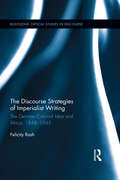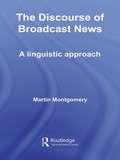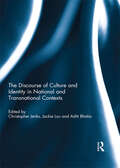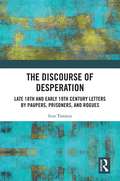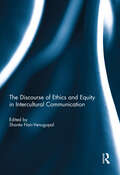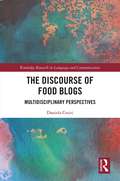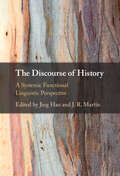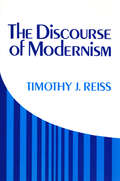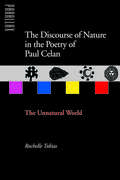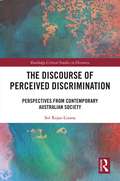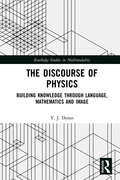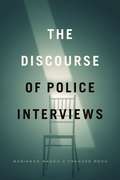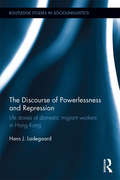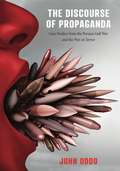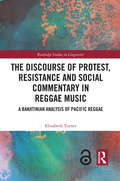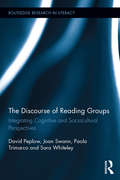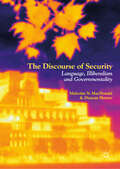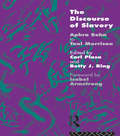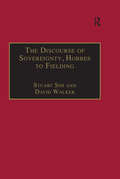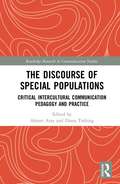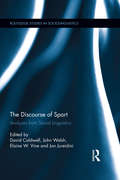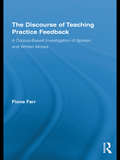- Table View
- List View
The Discourse Strategies of Imperialist Writing: The German Colonial Idea and Africa, 1848-1945 (Routledge Critical Studies in Discourse)
by Felicity RashIn this monograph, Felicity Rash examines German colonialist texts through the lens of linguistics, using multiple analytic approaches in order to contribute to the study of ideological discourse. Focusing on texts from Germany’s colonial period during the Second Reich, the book describes the discourse strategies employed in a wide variety of colonialist discourses, from propagandistic and journalistic writing to autobiographical and fictional accounts of life in Germany's African colonies. The methodologies Rash employs include the Discourse Historical Approach and Cognitive Metaphor Theory, and the book aims to develop a new model for the analysis of expansionist nationalist writing. Little detailed analysis exists of the types of texts taken as primary sources, and Rash provides English translations of German quotations, in addition to drawing upon her research in former German colonies in Africa. Rash’s research will be of interest to linguists, historians, Germanists, and social and political scientists, and lays the groundwork for future interdisciplinary analyses of German colonialism.
The Discourse of Broadcast News: A Linguistic Approach
by Martin MontgomeryIn this timely and important study Martin Montgomery unpicks the inside workings of what must still be considered the dominant news medium: broadcast news. Drawing principally on linguistics, but multidisciplinary in its scope, The Discourse of Broadcast News demonstrates that news programmes are as much about showing as telling, as much about ordinary bystanders as about experts, and as much about personal testimony as calling politicians to account. Using close analysis of the discourse of television and radio news, the book reveals how important conventions for presenting news are changing, with significant consequences for the ways audiences understand its truthfulness. Fully illustrated with examples and including detailed examination of the high profile case of ex-BBC journalist Andrew Gilligan, The Discourse of Broadcast News provides a comprehensive study which will challenge our current assumptions about the news. The Discourse of Broadcast News will be a key resource for anyone researching the news, whether they be students of language and linguistics, media studies or communication studies.
The Discourse of Culture and Identity in National and Transnational Contexts
by Christopher J. Jenks, Jackie Lou and Aditi BhatiaThis collection examines and uses discourse to promote a better understanding of culture and identity, with the primary goal of advancing an understanding of how discourse can be used to examine social and linguistic issues. Many of the contributions explore how the formation of culture and identity is shaped by national and transnational issues, such as migration, immigration, technology, and language policy. The collection contributes to a better understanding of the process of intercultural communication research, as each author takes a different theoretical or methodological approach to examining discourse. Although different aspects of discourse are analyzed in this collection, each contribution examines issues and concepts that are central to understanding and carrying out intercultural communication research (e.g., structure and agency, static and dynamic cultural constructs, sociolinguistic scales, power and discourse, othering and alienness, native and non-native). This book was originally published as a special issue of Language and Intercultural Communication.
The Discourse of Desperation: Late 18th and Early 19th Century Letters by Paupers, Prisoners, and Rogues (Routledge Studies in Linguistics)
by Ivor TimmisThis book discusses how the poor and desperate in the late eighteenth and early nineteenth centuries mobilised their linguistic resources in pursuit of vital pragmatic goals, drawing on three corpora of letters written by the poor. The main question addressed by the book is, ‘How were the poor, often armed only with low levels of education and literacy, able to meet the challenge of writing letters vital to their interests, even to their survival?’ Timmis argues that the answer lies in the highly strategic approach adopted by the writers, particularly evident in the way formulaic language is used in the pauper and prisoner letters. Formulaic language supports the writers in producing intelligible letters in what they consider an appropriate tone but also allows them to exploit popular cultural motifs of the time. Data is drawn from three sources: pauper letters by the poor applying for parish relief, from around 1795 to 1834; prisoner letters by women awaiting deportation to Australia for defrauding the Bank of England in the early nineteenth century; and anonymous letters by the poor demanding money with menaces. Comparison with the Mayhew Corpus of interviews with the London poor in the 1850s reinforces the idea that part of the writers’ approach was to orient away from the vernacular towards a style they perceived to be more elevated. Showing how resourceful people can be in communicating their needs in crises and in turn surfacing new insights into literacy and demotic language awareness, this book will be of interest to students and scholars in corpus linguistics and social history.
The Discourse of Ethics and Equity in Intercultural Communication
by Shanta Nair-VenugopalThis book examines the notions of ethics and equity in relation to language and communication in intercultural relations. Although these notions are often discussed, they are not always addressed with regard to specifi c subjects. Much intercultural discourse and dialogue in recent times has been coloured by the clash of civilizations (as described by Samuel Huntington), terrorist attacks such as 9/11, and the indelible effects which these events have had on dealings between different peoples, cultures and religions. This book discusses ethics and equity with regard to marginalized and privileged minorities, victims of abuse and of confl ict, researchers and practitioners, and language learners and speaker/users. It opens up spaces for a critical discourse of ethics and equity in language and intercultural communication as ‘new’ knowledge. This book was originally published as a special issue of Language and Intercultural Communication.
The Discourse of Food Blogs: Multidisciplinary Perspectives (Routledge Research in Language and Communication)
by Daniela CesiriThis volume adopts a multidisciplinary perspective in analyzing and understanding the rich communicative resources and dynamics at work in digital communication about food. Drawing on data from a small corpus of food blogs, the book implements a range of theoretical frameworks and methodological approaches to unpack the complexity of food blogs as a genre of computer-mediated communication. This wide-ranging framework allows for food blogs’ many layered components, including recipes, photographs, narration in posts, and social media tie-ins, to be unpacked and understood at the structural, visual, verbal, and discourse level in a unified way. The book seeks to provide a comprehensive account of this popular and growing genre and contribute to our understandings of digital communication more generally, making this key reading for students and scholars in computer-mediated communication, multimodality, critical discourse analysis, corpus linguistics, and pragmatics.
The Discourse of History: A Systemic Functional Linguistic Perspective
by J. R. Martin Jing HaoTaking a Systemic Functional Linguistic perspective, this book explores how language builds our knowledge about the past and gives value to historical events, thereby shaping contemporary culture. It brings together cutting-edge research from an international team of scholars to provide a detailed study of texts from three different world languages (English, Spanish, and Mandarin Chinese) – revealing how the discourse of history is constructed in these languages. Each chapter provides examples and step-by-step analyses of how knowledge and value are constructed in history texts, drawing on Systemic Functional Linguistics to develop theory and description in relation to text analysis. It also makes connections with disciplinary literacy and history education, showing how linguistic findings can benefit the teaching and learning of historical literacy. Providing theoretical and analytical foundations for studies of the discourse of history, it is essential reading for anyone interested in literacy, discourse analysis, and language description.
The Discourse of Modernism
by Timothy J. ReissTimothy J. Reiss perceives a new mode of discourse emerging in early seventeenth-century Europe; he believes that this form of thought, still our own, may itself soon be giving way. In The Discourse of Modernism, Reiss sets up a theoretical model to describe the process by which one dominant class of discourse is replaced by another. He seeks to demonstrate that each new mode does not constitute a radical break from the past but in fact develops directly from its predecessor.
The Discourse of Nature in the Poetry of Paul Celan: The Unnatural World (Parallax: Re-visions of Culture and Society)
by Rochelle TobiasPaul Celan has long been regarded as the most important European poet after 1945 but also the most difficult owing to the numerous references in his work to his personal history and to a cultural heritage spanning many disciplines, centuries, and languages. In this insightful study, Rochelle Tobias goes a long way to dispelling the obscurity that has surrounded the poet and his work. She shows that the enigmatic images in his poetry have a common source. They are drawn from the disciplines of geology, astrology, and physiology or what could be called the sciences of the earth, the heavens, and the human being. Celan’s poetry borrows from each of these disciplines to create a poetic universe—a universe that attests to what is no longer and projects what is not yet.This is the unnatural world of Celan's poetry. It is a world in which time itself takes physical form or is made plastic. Through a series of close readings and philosophical explorations, Tobias reflects on the experience of time encoded and embodied in Celan's work. She demonstrates that the physical world in his poetry ultimately serves as a showcase for time, which is the most elusive aspect of human experience because it is based nowhere but in the mind. Tobias's probing interpretations present a new model for understanding Celan's work from the early elegiac poems to the later cryptic texts.An interdisciplinary project, the study combines readings of Celan's poetry with discussions of ancient and modern science, mystical cosmology, and twentieth-century literature and thought. Tobias's original approach to Celan illuminates his complex verse and contributes significantly to the theory of metaphor as it applies to modern verse.
The Discourse of Perceived Discrimination: Perspectives from Contemporary Australian Society (Routledge Critical Studies in Discourse)
by Sol Rojas-LizanaThis book offers a way forward toward a better understanding of perceived discrimination from a critical discourse studies perspective. The volume begins with a discussion of quantitative studies on perceived discrimination across a range of disciplines and moves toward outlining the ways in which a discourse-based framework, drawing on tools from cognitive linguistics and discursive psychology, offers valuable tools with which to document and analyze perceived discrimination through myriad lenses. Rojas-Lizana provides a systematic account, grounded in a critical approach, of perceived discrimination drawing on data from discourse from two minority groups, self-identified members of an LGBTIQ community and Spanish-speaking immigrants in Australia, and explores such topics as the relationship between language and discrimination, the conditions for determining what constitutes discriminatory acts, and both the copying and resistance strategies victims employ in their experiences. A concluding chapter offers a broader comparison of the conclusions drawn from both communities and discusses their implications for further research on perceived discrimination. This volume will be of particular interest to students and scholars in critical discourse studies, social policy, gender and sexuality studies, and migration studies.
The Discourse of Physics: Building Knowledge through Language, Mathematics and Image (Routledge Studies in Multimodality)
by Y. J. DoranThis book provides a detailed model of both the discourse and knowledge of physics and offers insights toward developing pedagogy that improves how physics is taught and learned. Building on a rich history of applying a Systemic Functional Linguistics approach to scientific discourse, the book uses an SFL framework, here extended to encompass the more recently developed Systemic Functional Multimodal Discourse Analysis approach, to explore the field’s multimodal nature and offer detailed descriptions of three of its key semiotic resources – language, image, and mathematics. To complement the book’s SFL underpinnings, Doran draws on the sociological framework of Legitimation Code Theory, which offers tools for understanding the principles of how knowledge is developed and valued, to explore the manifestation of knowledge in physics specifically and its relationship with discourse. Through its detailed descriptions of the key semiotic resources and its analysis of the knowledge structure of physics, this book is an invaluable resource for graduate students and researchers in multimodality, discourse analysis, educational linguistics, and science education.
The Discourse of Police Interviews
by Marianne Mason Frances RockForensic linguistics, or the study of language and the law, is a growing field of scholarly and public interest with an established research presence. The Discourse of Police Interviews aims to further the discussion by analyzing how police interviews are constructed and used to investigate and prosecute crimes. The first book to focus exclusively on the discourses of police interviewing, The Discourse of Police Interviews examines leading debates, approaches, and topics in contemporary police interview research. Among other topics, the book explores the sociolegal, psychological, and discursive framework of popular police interview techniques employed in the United States and the United Kingdom, such as PEACE and Reid, and the discursive practices of institutional representatives like police officers and interpreters that can influence the construction and quality of linguistic evidence. Together, the contributions situate the police interview as part of a complex, and multistage, criminal justice process. The book will be of interest to both scholars and practitioners in a variety of fields, such as linguistic anthropology, interpreting studies, criminology, law, and sociology.
The Discourse of Police Interviews
by Marianne Mason Frances RockForensic linguistics, or the study of language and the law, is a growing field of scholarly and public interest with an established research presence. The Discourse of Police Interviews aims to further the discussion by analyzing how police interviews are constructed and used to investigate and prosecute crimes. The first book to focus exclusively on the discourses of police interviewing, The Discourse of Police Interviews examines leading debates, approaches, and topics in contemporary police interview research. Among other topics, the book explores the sociolegal, psychological, and discursive framework of popular police interview techniques employed in the United States and the United Kingdom, such as PEACE and Reid, and the discursive practices of institutional representatives like police officers and interpreters that can influence the construction and quality of linguistic evidence. Together, the contributions situate the police interview as part of a complex, and multistage, criminal justice process. The book will be of interest to both scholars and practitioners in a variety of fields, such as linguistic anthropology, interpreting studies, criminology, law, and sociology.
The Discourse of Police Interviews
by Marianne Mason Frances RockForensic linguistics, or the study of language and the law, is a growing field of scholarly and public interest with an established research presence. The Discourse of Police Interviews aims to further the discussion by analyzing how police interviews are constructed and used to investigate and prosecute crimes. The first book to focus exclusively on the discourses of police interviewing, The Discourse of Police Interviews examines leading debates, approaches, and topics in contemporary police interview research. Among other topics, the book explores the sociolegal, psychological, and discursive framework of popular police interview techniques employed in the United States and the United Kingdom, such as PEACE and Reid, and the discursive practices of institutional representatives like police officers and interpreters that can influence the construction and quality of linguistic evidence. Together, the contributions situate the police interview as part of a complex, and multistage, criminal justice process. The book will be of interest to both scholars and practitioners in a variety of fields, such as linguistic anthropology, interpreting studies, criminology, law, and sociology.
The Discourse of Powerlessness and Repression: Life stories of domestic migrant workers in Hong Kong (Routledge Studies in Sociolinguistics)
by Hans J. LadegaardDrawing on a large corpus of narratives recorded at a church shelter for abused domestic helpers in Hong Kong, this monograph explores how the women discursively construct themselves in sharing sessions with other helpers. They see themselves as ‘helpers’ who have come to Hong Kong to help their families, to help the people in the city, and to serve God. A wide variety of competing identities are constructed in the narratives: submissive helper, sacrificial mother, daughter and wife, and powerless traumatised victim, but also resourceful indignant migrant women who, through sharing and peer support, become empowered to fight against abusive employers. This book provides a detailed discourse analysis of the women’s narratives, but it also explores larger issues such as global migration, exploitation, language and power, abuse and the psychology of evil, intergroup communication, and peer support and empowerment.
The Discourse of Propaganda: Case Studies from the Persian Gulf War and the War on Terror
by John OddoIn the early 1990s, false reports of Iraqi soldiers in Kuwait allowing premature infants to die by removing them from their incubators helped to justify the Persian Gulf War, just as spurious reports of weapons of mass destruction later undergirded support for the Iraq War in 2003. In The Discourse of Propaganda, John Oddo examines these and other such cases to show how successful wartime propaganda functions as a discursive process.Oddo argues that propaganda is more than just misleading rhetoric generated by one person or group; it is an elaborate process that relies on recontextualization, ideally on a massive scale, to keep it alive and effective. In a series of case studies, he analyzes both textual and visual rhetoric as well as the social and material conditions that allow them to circulate, tracing how instances of propaganda are constructed, performed, and repeated in diverse contexts, such as speeches, news reports, and popular, everyday discourse.By revealing the agents, (inter)texts, and cultural practices involved in propaganda campaigns, The Discourse of Propaganda shines much-needed light on the topic and challenges its readers to consider the complicated processes that allow propaganda to flourish. This book will appeal not only to scholars of rhetoric and propaganda but also to those interested in unfolding the machinations motivating America’s recent military interventions.
The Discourse of Propaganda: Case Studies from the Persian Gulf War and the War on Terror
by John OddoIn the early 1990s, false reports of Iraqi soldiers in Kuwait allowing premature infants to die by removing them from their incubators helped to justify the Persian Gulf War, just as spurious reports of weapons of mass destruction later undergirded support for the Iraq War in 2003. In The Discourse of Propaganda, John Oddo examines these and other such cases to show how successful wartime propaganda functions as a discursive process.Oddo argues that propaganda is more than just misleading rhetoric generated by one person or group; it is an elaborate process that relies on recontextualization, ideally on a massive scale, to keep it alive and effective. In a series of case studies, he analyzes both textual and visual rhetoric as well as the social and material conditions that allow them to circulate, tracing how instances of propaganda are constructed, performed, and repeated in diverse contexts, such as speeches, news reports, and popular, everyday discourse.By revealing the agents, (inter)texts, and cultural practices involved in propaganda campaigns, The Discourse of Propaganda shines much-needed light on the topic and challenges its readers to consider the complicated processes that allow propaganda to flourish. This book will appeal not only to scholars of rhetoric and propaganda but also to those interested in unfolding the machinations motivating America’s recent military interventions.
The Discourse of Protest, Resistance and Social Commentary in Reggae Music: A Bakhtinian Analysis of Pacific Reggae (Routledge Studies in Linguistics)
by Elizabeth TurnerA comprehensive, engaging and timely Bakhtinian examination of the ways in which the music and lyrics of Pacific reggae, aspects of performance, a record album cover and the social and political context construct social commentary, resistance and protest. Framed predominantly by the theory and philosophy of Russian literary theorist Mikhail Bakhtin, this innovative investigation of the discourse of Pacific reggae in New Zealand produces a multi-faceted analysis of the dialogic relationships that create meaning in this genre of popular music. It focuses on the award-winning EP What’s Be Happen? by the band Herbs, which has been recognised for its ground-breaking music and social commentary in the early 1980s. Herbs’ songs address the racism and ideology of the apartheid regime in South Africa and the relationship between sport and politics, as well as universally relevant conflicts over race relations, the experiences of migrants, and the historic and ongoing loss of indigenous people’s lands. The book demonstrates the striking compatibility between Bakhtin’s theorisation of utterances as ethical acts and reggae music, along with the Rastafari philosophy that underpins it, which speaks of resistance to social injustice, of ethical values and the kind of society people seek to achieve. It will appeal to a cross-disciplinary audience of scholars in Bakhtin studies; discourse analysis; popular cultural studies; the literary analysis of popular music and lyrics, and those with an interest in the culture and politics of Aotearoa New Zealand and the Pacific region.
The Discourse of Reading Groups: Integrating Cognitive and Sociocultural Perspectives (Routledge Research in Literacy)
by Joan Swann Sara Whiteley Paola Trimarco David PeplowOf interest in their own terms as a significant cultural practice, reading groups also provide a window on the everyday interpretation of literary texts. While reading is often considered a solitary process, reading groups constitute a form of social reading, where interpretations are produced and displayed in discourse. The Discourse of Reading Groups is a study of such joint conceptual activity, and how this is necessarily embedded in interpersonal activity and the production of reader identities. Uniquely in this context it draws on, and seeks to integrate, ideas from both cognitive and social linguistics. The book will be of interest to scholars in literacy studies as well as cultural and literary studies, the history of reading, applied linguistics and sociolinguistics, digital technologies and educational research.
The Discourse of Security: Language, Illiberalism And Governmentality (Postdisciplinary Studies in Discourse)
by Malcolm N. MacDonald Duncan HunterThis book explores how language constructs the meaning and praxis of security in the 21st century. Combining the latest critical theories in poststructuralist and political philosophy with discourse analysis techniques, it uses corpus tools to investigate four collections of documents harvested from national and international security organisations. This interdisciplinary approach provides insights into the ways in which discourse has been mobilised to construct a strategic response to major terrorist attacks and geo-political events. The authors identify the way in which it is used to realize tactics of governmentality and form security as a discipline. This at once constructs a state of exception while also adhering to the principles of liberalism. This insightful study will be of particular interest to students and scholars of subjects such as applied linguistics, political science, security studies and international relations, with additional relevance to other areas including law, criminology, sociology and economics.
The Discourse of Slavery: From Aphra Behn to Toni Morrison
by Carl Plasa Betty J. RingFirst published in 1994. Routledge is an imprint of Taylor & Francis, an informa company.
The Discourse of Sovereignty, Hobbes to Fielding: The State of Nature and the Nature of the State (Studies in Early Modern English Literature)
by David Walker Stuart SimIn this new study the authors examine a range of theories about the state of nature in seventeenth- and eighteenth-century England, considering the contribution they made to the period's discourse on sovereignty and their impact on literary activity. Texts examined include Leviathan, Oceana, Paradise Lost, Discourses Concerning Government, Two Treatises on Government, Don Sebastian, Oronooko, The New Atalantis, Robinson Crusoe, Dissertation upon Parties, David Simple, and Tom Jones. The state of nature is identified as an important organizing principle for narratives in the century running from the Civil War through to the second Jacobite Rebellion, and as a way of situating the author within either a reactionary or a radical political tradition. The Discourse of Sovereignty provides an exciting new perspective on the intellectual history of this fascinating period.
The Discourse of Special Populations: Critical Intercultural Communication Pedagogy and Practice (Routledge Research in Communication Studies)
by Ahmet Atay Diana TrebingThe term "special population" occupies a particular purpose and has a particular role in the discourse of higher education. This book uses the term as an umbrella term for any student who tends to be underrepresented on college campuses and has a very specific set of unique needs: among others, individuals with physical and learning disabilities, international students, ethnic minorities, LGBTQ students, single parents, and first generation and other non-traditional student groups. Sometimes these "special" student groups are visible to educators; however, quite often they are hidden in plain sight, which makes it difficult for educators to work effectively and meaningfully with these student groups. This book uses the framework of critical intercultural communication pedagogy to generate a discussion about pedagogical issues surrounding students who are categorized as "special populations", focusing on culturally sensitive pedagogical methods to educate all students.
The Discourse of Sport: Analyses from Social Linguistics (Routledge Studies in Sociolinguistics)
by John Walsh David Caldwell Elaine W. Vine Jon JureidiniThis collection brings together innovative research from socially-oriented applied linguists working in sports. Drawing on contemporary approaches to applied linguistics, this book provides readers with in-depth analyses of examples of language-in-use in the context of sport, and interprets them through the lens of larger issues within sport culture and practice. With contributions from an international group of scholars, this an essential reference for scholars and researchers in applied linguistics, discourse analysis, sport communication, sport management, journalism and media studies.
The Discourse of Teaching Practice Feedback: A Corpus-Based Investigation of Spoken and Written Modes (Routledge Advances In Corpus Linguistics Ser. #12)
by Fiona FarrIn this book, Farr examines the spoken and written language of post-observation teaching-practice feedback on teacher education programs. To do so, she draws upon theories from discourse analysis, conversation analysis, and pragmatics to frame the analysis of feedback meetings and written tutor reports, which are then examined using comparative quantitative and qualitative corpus-based techniques. The overall aim is to determine the defining characteristics of this genre, focusing especially on pragmatic factors, with the ultimate goal of investigating the salient aspects responsible for making feedback both effective and affective. Farr's research draws upon a spoken corpus of feedback interactions and a written corpus of tutor reports from language teacher education and is also strongly informed by data in the form of diary reflections and questionnaire responses from student teachers and questionnaire responses from the relevant tutors.
